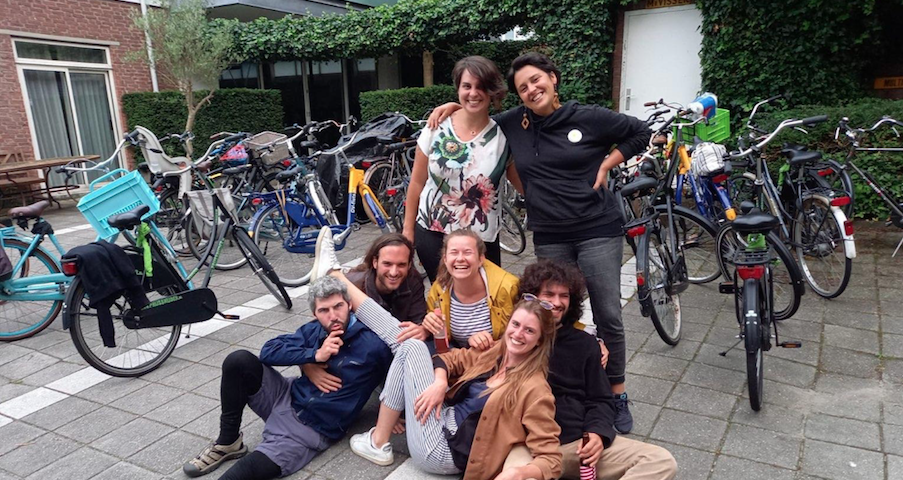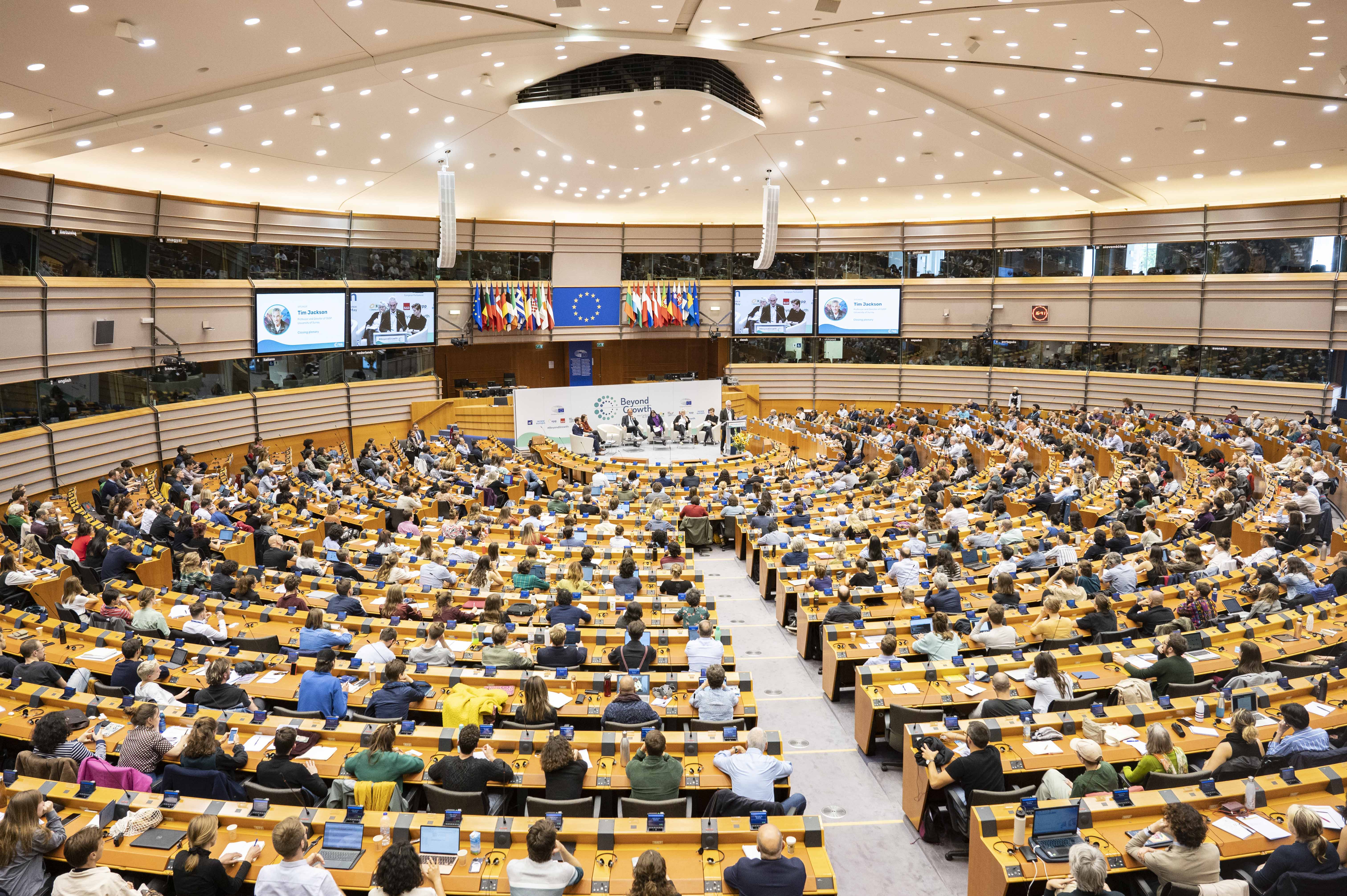This summer, the 8th International Degrowth conference took place in Den Haag. This summary provides a peek at some of the important themes, take-aways, and points of contention discussed in the conference reportage co-published by the organisers Transnational Institute and Ontgroei.
Born in Europe but with roots across the world, “degrowth” interrogates the economic, sociocultural, environmental, and political ramifications of a turn away from economic growth as societies’ primary indicator of progress. The two degrowth conferences that took place in 2021 illustrate degrowth’s growing relevance and breadth. Compared to the Manchester-based ‘Building Alternative Livelihoods in times of ecological and political crisis’, the conference in Den Haag had a stronger focus on counterculture, anarchism, and the humanities.
The conference served as a gathering space for the degrowth community and a host of movements, frameworks, and initiatives to meet and debate. Over five days, this hybrid conference, titled “Caring Communities for Radical Change”, explored the linkages between degrowth and eight core themes: Feminist Political Ecology; Decoloniality; Dutch Social Movements; Embodying Degrowth; Cultural Politics; Green New Deals; Anarchism; and Urban-Rural Dialogues.
Participants explored different tactics and approaches, visions, and political sensibilities, and wrestled with critical questions such as: On what levels must change occur? What is the role of governments in political change? How should movements or activists relate to the state? To whom and with whom do advocates for socio-ecological justice seek to speak and connect? Whose interests do we foreground? What does care and solidarity mean?
This is a brief overview of some of the questions and themes explored in the longer report. The report is based on my reflections and exchanges in the organisational process leading up to the event, the conference itself - both in the formal presentations and during informal discussions and debates - as well as follow-up interviews with several of the organisers. In this blog post I will summarize some of the key topics and learnings.
Understanding Degrowth: movement, community, framework, or networked solidarity?
The conference was a multi-dimensional community-building effort. The first dimension was the organisational process itself which strove towards a conscious degrowth politics, working in accordance with the principles of horizontality, democratic decision-making, and building relations of care. Through close cooperation with food coops, autonomous spaces, and community gardens, the organisers embedded the conference in local activist structures.
Secondly, while international in nature, the conference was very situated in the Netherlands, aiming to introduce the term ‘Degrowth’ into debates already taking place locally, thus making it more visible. The plenary of the Dutch Social Movements thematic stream, for instance, provided a space for exchange between several Dutch initiatives ranging from food forests, to repair cafés, and campaign and strategic litigation organisations.
More broadly, the conference brought degrowth into conversation with different frameworks, political movements/initiatives, and fields of research. These differed in nature as well as in their relationship with degrowth, varying in degree and familiarity and displaying synergies as well as tensions.
The workshops and plenaries of the conference unpacked the diverse approaches, tactics, and political orientations of the various movements and initiatives represented, and explored how they might collectively form a whole greater than the sum of its parts.
During the conference, degrowth exhibited two predominant dimensions: as an analytic framework and as a network or community of aligned initiatives, causes, and struggles. Thereby, it gave a glimpse of both the complexity and the possibilities of building a wider network, community, or movement for degrowth within a national and international context.
However, some core constituencies were not represented at the conference, such as representatives of political parties, larger Dutch social movements, trade unions and workers’ organisations, migrant organisations or other groups representing minorities and/or marginalised members of society. Questions of social, racial and other injustices were at the core of many sessions and debates among participants. Yet, those affected were largely not present.
Visions & Politics
The conference provided a fertile ground for the broader degrowth community to explore diverse visions of socio-ecological transformations. Thematically, for instance, the Urban-Rural Dialogue stream investigated how degrowth can heal the antagonistic relationships between the city and the countryside produced by our growth-based economies.
Sessions within the Cultural Politics and Embodying Degrowth thematic stream discussed the role that spirituality, culture, and psychology play. Some provided an interactive space for participants to explore together how and on what levels change is felt and experienced. Others investigated the role of hegemonic culture in the creation of consumer imaginaries and means of emancipation.
To transcend the academic roots of many degrowth discussions, the conference organisers collaborated with artists and activists to build an inclusive space that avoided prioritising a single way of knowing. Artistic events and activities took place throughout the week, such as the collective building of a mycelium pigeon tower, visual installations, and movie screenings.
Overall, these excursions re-defined (struggles for) change as more than an abstract process taking place at the macro-level. Instead, they become situated in lived reality, employing tactics that ‘touch’ people and make visible the interdependence of external structures such as economic and political institutions and the internal make-up - the values, psychology and beliefs - of individuals and groups, thereby opening a space for alternative practices, imaginaries, and resistances.
With regards to politics/political questions, participants and presenters engaged on matters such as the agents and location of change and the role of the state. Will change come from the margins, brought about by people who exit the system, building alternatives and mobilising in opposition to the state? Or will it come from within the system, accruing through an increasing pressure to reform, influencing decision-makers at all levels and mobilising people across all backgrounds who are slowly waking up to the realities of approaching socio-ecological collapse? What are the risks and pitfalls of the respective approaches? Where are the spaces for mutual learning?
Rich, lively, and sometimes heated debates at the conference show that these two approaches are both very present in the degrowth community today, without a clear synthesis or consensus in sight. To be sure, there exists broad complementarity overall and these debates are a sign of health for a political community. But they nonetheless represent the endpoints of a wider political spectrum, mirroring and hinting at present and future political debates in degrowth.
Outlook
The degrowth community is expanding. Yet, to consolidate itself more strongly as an organised movement, it needs to connect to wider social forces. Some suggested this may mean moving towards a more inclusive format than a conference, something more closely resembling a festival, providing a more informal space for mingling and exchange.
Others advocated for mobilising on issues such as debt, land appropriations by business and local governments, rising rent prices, the “crisis of care,” the right to healthy and locally produced food, or visions of meaningful and dignified work for those currently employed in environmentally destructive sectors may be ways to connect with other struggles and broaden the groups involved.
As the degrowth community grows, and deepens its analysis through conferences, workshops, and other spaces these potential next-steps or outlooks(?) could provide a meaningful focus for future conversations.

In 2024, Degrowth.info celebrates its 10th anniversary. We give you some insights into our collective: from our horizontal structure and our involvement in the degrowth movement to our team's political friendship and laughter.

After the excitement of an intense three-days Beyond Growth Conference 2023 (BGC), attended by 7,000 participants (on-site and online), the time is ripe to distil critical reflections.

On August 14th, an uprising of art installations and happenings emerged in the Old North End neighborhood of Burlington, Vermont. Two days later, they all disappeared. Through these art pieces, community members and local organizations explored today’s tensions and possible paths toward desirable futures. Burlington residents navigated the neighborhood on self-guided tours, following a m...